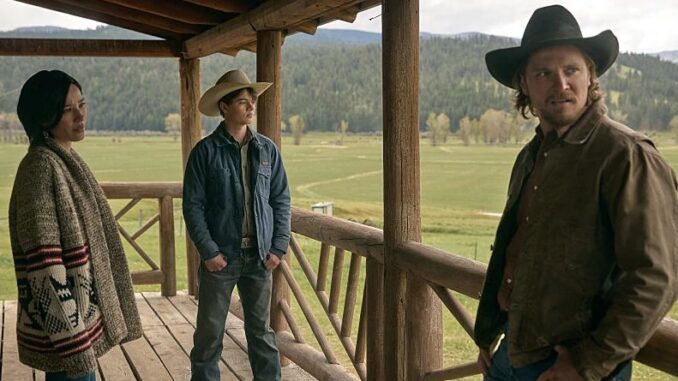
I love the smell of the high country, the crisp, thin air that carries the scent of pine and sagebrush, the promise of vast, untamed wilderness. And for a specific kind of American escapism, I love Yellowstone. The show is a cinematic postcard, an ode to the mythic American West, even as it skewers its modern manifestations. John Dutton and his clan are a powder keg of resentment and fierce loyalty, carving out their empire against a backdrop of sweeping vistas and the relentless encroachment of modernity. It’s a show that understands the allure of raw power, of blood loyalty, and the seductive lie that some people are simply meant to rule.
The appeal of Yellowstone is undeniable. It scratches an itch for drama on an epic scale, where the stakes are land, legacy, and life itself. The cinematography alone is worth the price of admission, transforming Montana into a character as formidable as any Dutton. It’s a modern Western tableau, populated by cowboys in designer jeans, corporate raiders, and indigenous peoples fighting for their ancestral rights. It’s loud, often melodramatic, and undeniably entertaining, a balm for anyone who dreams of leaving the city behind for a life governed by horses, cattle, and brutal, unwritten laws. But for all its swagger and stunning visuals, Yellowstone is not the best neo-Western TV show of all time. Not even close. That crown belongs to a masterpiece that came out 15 years ago, a show that redefined the genre, stripped it bare, and rebuilt it with a terrifying, beautiful precision: Breaking Bad.
Fifteen years ago, in January 2008, a seemingly unassuming drama about a high school chemistry teacher diagnosed with lung cancer premiered, quietly, almost modestly. What followed was a five-season odyssey that stands as a towering achievement in television history and, crucially, as the definitive neo-Western. While Yellowstone presents a recognizable, albeit heightened, version of the Western frontier, Breaking Bad showed us that the frontier isn't just land anymore; it's the space between legal and illegal, moral and immoral, where the laws of man give way to the laws of the self-made outlaw.
Think about it: Walter White, our protagonist, is a man pushed to the edge, feeling emasculated and overlooked. His transformation into Heisenberg isn't just about making money; it's about reclaiming his masculinity, building an empire, and forging his own destiny in a lawless, sun-baked landscape. The high plains of New Mexico, with their vast, empty stretches of desert, become the perfect, parched backdrop for his moral desertification. His blue meth is his gold strike, his RV a covered wagon, and the rival drug kingpins his competing cattle barons. Jesse Pinkman is his perpetually troubled sidekick, and Gus Fring a chillingly composed, modern-day Wyatt Earp, except he’s on the wrong side of the law, establishing his own brand of ruthless order.
Where Yellowstone sketches its characters with broad, archetypal strokes – the stoic patriarch, the fiery daughter, the loyal but conflicted adopted son – Breaking Bad delved into the terrifying, exhilarating minutiae of one man's soul-shattering metamorphosis. John Dutton is a static force of nature, a mountain that mostly endures. Walter White is a raging river, eroding everything in his path, including himself, constantly changing, deepening, becoming more dangerous with every twist and turn. His "I am the one who knocks" speech isn't just a tough line; it's the declaration of a new kind of frontier justice, delivered by an urban outlaw who has shed every shred of his former, domesticated self.
The moral ambiguity of Breaking Bad utterly dwarfs Yellowstone's often clear-cut, if brutal, ethical lines. In Yellowstone, even the anti-heroes like Rip are ultimately fighting for something identifiable as "their people" or "their land." There’s a code, however twisted. In Breaking Bad, the code disintegrates, replaced by pure, unadulterated self-interest and a terrifying lust for power. The show forces us to confront our own complicity, to question where our sympathies lie as Walter descends further into villainy. It's a tragedy of Shakespearean proportions, an American epic of self-creation and self-destruction, set not against glorious mountains, but against the mundane, unforgiving sprawl of suburbia and industrial parks.
So, yes, I’ll still queue up Yellowstone for its stunning vistas and its escapist fantasy of a family that lives by its own rules. But when I crave a true neo-Western, a show that understood the modern American spirit of rugged individualism twisted into something monstrous, that explored the true wilderness of the human heart in the 21st century, my mind wanders back 15 years. Back to the arid plains of Albuquerque, the hum of a meth lab in a dilapidated RV, and the chilling, transformative journey of a man named Walter White. That, unequivocally, is the best neo-Western TV show of all time.
